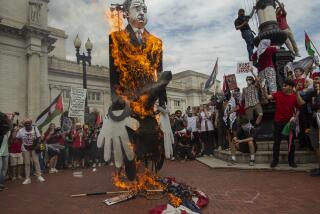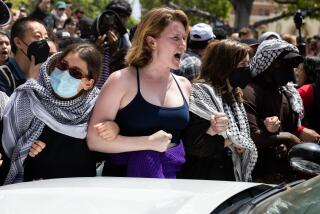Can Occupy Wall Street be more than talk, teach-ins and tents?
- Share via
Is the Occupy Wall Street movement going to transform America or dither and disappear?
Chicago on May Day will be one place to look for answers. Plans were laid through the winter to gather 50,000 protesters in the city on that day to confront the simultaneous summits of NATO and the G8. There’s one big glitch in the program though; the Obama administration has moved the G8 summit – the gathering of diplomats and financial wizards from the leading industrialized nations – to Camp David, Md.
For an army of activists whose core critique is aimed at the corruption and greed of bankers, financiers and their political patrons, the G8 meeting was a perfect foil. NATO generals and diplomats seem a little off target.
Still, the OWS folks are nothing if not creative and they will come up with something. The question is whether it will be relevant. Last fall, at the height of the protests that began in New York’s Zuccotti Park and sprang up in city after city, all the way to Oakland, Occupy Wall Street seized the attention of the nation and, for the first time in a couple of years, shifted the terms of debate from the tea party’s obsession with big, bad government to the 99-to-1 split of wealth in the country.
Even last fall, however, there were doubts that the occupy movement would have a lasting influence on American politics and economics. It wasn’t just obtuse commentators from Fox News and CNN with their jokes about pot-smoking hippies who were skeptical; it was also serious political thinkers. Liberal icon Barney Frank, the gay, lefty congressman from Massachusetts, said at the time that unless the occupiers organized to have a direct effect on electoral politics, all their earnest idealism would do little to change the corrupt symbiosis between Wall Street and Congress.
Defenders of the OWS way of doing things insisted the media and the old-line politicians were clueless old fogies who did not appreciate the power of a leaderless, decentralized, process-driven, social-networked movement. In an online commentary written for CNN in October, media theorist Douglas Rushkoff said the critics were missing the point entirely.
“What upsets banking’s defenders and politicians alike is the refusal of this movement to state its terms or set its goals in the traditional language of campaigns,” Rushkoff wrote. “That’s because, unlike a political campaign designed to get some person in office and then close up shop (as in the election of Obama), this is not a movement with a traditional narrative arc. As the product of the decentralized networked-era culture, it is less about victory than sustainability. It is not about one-pointedness, but inclusion and groping toward consensus. It is not like a book; it is like the Internet.”
Rushkoff compared the incomprehension of OWS’s detractors to the bewilderment of Arab dictators confronted by protesters in the streets of the Middle East. Others have made the same analogy, especially with the thousands of young people who occupied Cairo’s Tahrir Square until Hosni Mubarak gave up power.
The comparison seems apt, but it may give more weight to Frank’s argument than to Rushkoff’s defense. Yes, the protesters in Cairo drove out the man at the top, but the generals who were Mubarak’s base of power remain in charge. The protesters were too disorganized to compete successfully in Egypt’s recent elections; victory went to those who did have an organization: the Muslim Brotherhood. If and when the generals cede control, it will be to the Islamists, not to the democratic dreamers in the streets.
The people in the Occupy Wall Street movement have shown they can take over a park, pitch a tent, run a teach-in and give everyone time to talk. They are still far from proving they can change a country.
More to Read
Get the L.A. Times Politics newsletter
Deeply reported insights into legislation, politics and policy from Sacramento, Washington and beyond. In your inbox twice per week.
You may occasionally receive promotional content from the Los Angeles Times.









